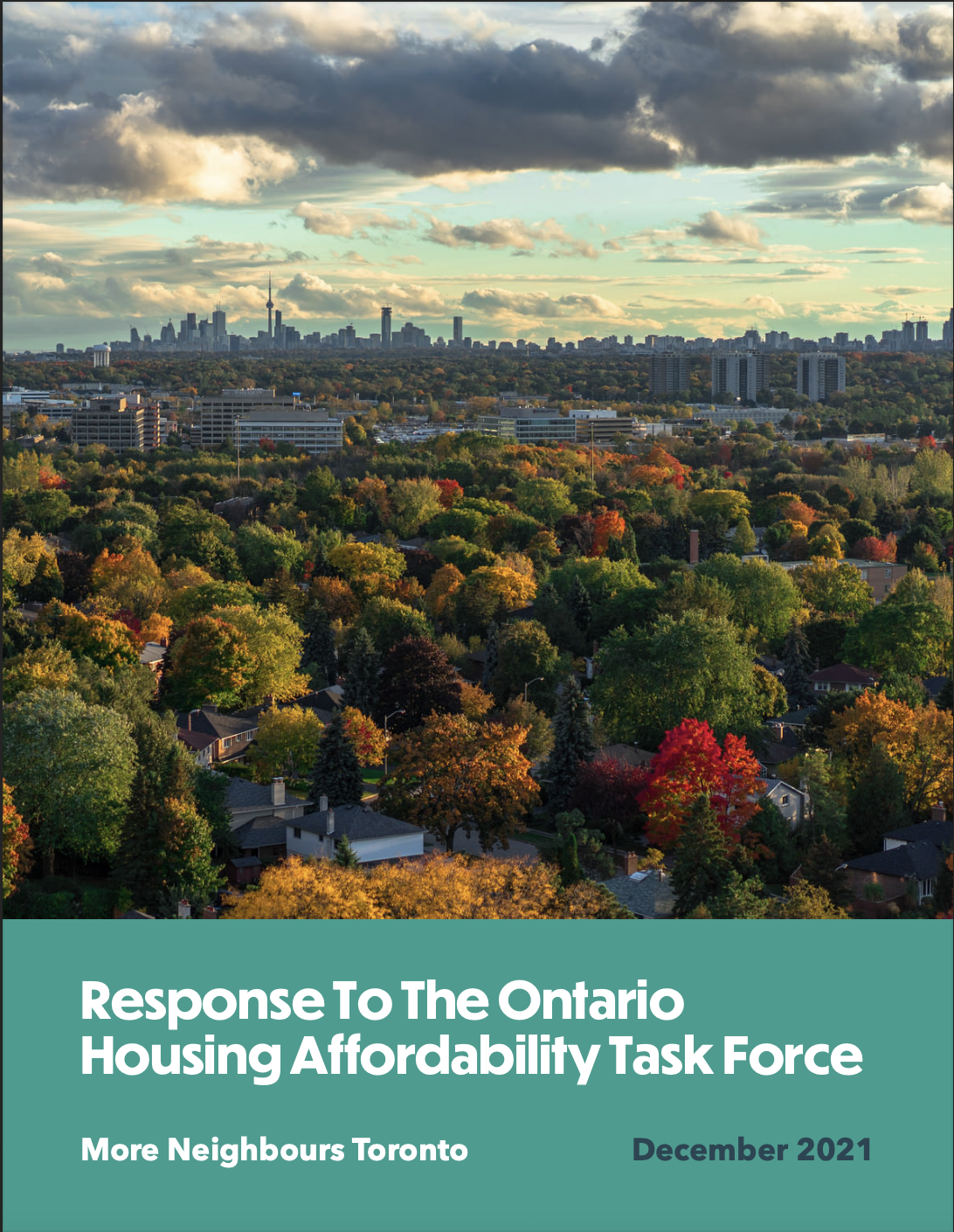Read The Full Report here: https://drive.google.com/file/d/1A-dvUwS-KkjnwpAWlYl_0u0K-ChAaEz4/view?usp=sharing
------
Introduction Editorial
Toronto and Ontario’s housing crises have reached a breaking point. Decades of inaction, policy failures, excessive regulatory capture, and political domination by exclusionary anti-housing interests have culminated in diminishing social and economic mobility. In Toronto, the cost of the average dwelling has moved far beyond what the average family can afford. The cost of housing relative to income is now worse than that of San Francisco, a city famous for its long-run housing crisis. The consequences of permanently expensive housing are too devastating to ignore any longer.
Our society can set goals for housing growth and prices that are underpinned by our values and love for our communities. We can repair the social contract between generations and classes that decades of exclusionary planning have broken. We must agree that every family should have access to decent housing that meets their needs at every stage of life in the communities they love. We can return to a society where the dream of homeownership is achievable instead of a fantasy to ordinary people. We must agree that housing is more than a financial asset because it carries social, environmental, and economic values that are not reflected in the state of financial commodification we see today. We must return to an era where housing values are seen as a store of wealth (savings) instead of a highly leveraged growth asset that outcompetes public financial markets without improved value. Until such time, the housing market will continue to divert capital away from productive economic activity into land values, property values, and rents paid to landlords.
We must build, encourage, and grow mixed income communities because we understand that geographic economic stratification will make us all poorer in the long term. We should value creating an open society with high levels of social and economic mobility so that residents can achieve their potential no matter where they’re born. We must recognize that individual goodness cannot be measured by financial success in a market economy, and therefore, we need solutions to help the underprivileged afford the decent housing that they deserve. We must rectify the systematic exclusion in contemporary planning that determines where racial minorities and the working class can afford to live. We must stop confining the most disadvantaged members of our society to transit corridors and avenues because they are our neighbours and not pollution or noise shields for rich neighbourhoods. We must believe in an outcome of housing policy that maximizes the freedom of every resident to pursue their best lives, innovate in our economy, and contribute to a more just society.
In an era where we increasingly understand the impacts of growth on the environment, we must aim for policy that generates sustainable abundance for all. In Toronto (and Ontario) today, we predominantly have two modes of growth - sprawl and tall. Both are unsustainable. We have the space to grow in existing developed land. Massive towers made of concrete and steel have significant embodied carbon emissions, even as they become more efficient over their lifetime. Sprawl maximizes individual emissions through heat inefficiency, promotion of excessive driving, and by decimating greenfield space. More than that, sprawl costs municipalities more every year to service than they collect in property taxes. We must legalize and encourage more efficient forms of growth. This means wood framed multifamily housing close to transit, jobs, and community infrastructure, in places Ontarians want to live. This means changing the incentives towards neighbourhood growth, so that residents who live in higher density housing are not subsidizing richer residents through property taxes. We must, as a society and as a province, ensure that our growth is environmentally, economically, and socially sustainable.
Our submission to the province does not come with the expectation that every idea will be considered. However, we believe the major principles we’ve developed should guide the task force in its own report. We think that the first step to ending the housing crisis is to ensure the housing market functions like a market. Basic reforms to market incentives will help more than just market-rate supply, as many of the same barriers are faced by builders of non-profit and non-market housing. We believe the task force must not leave affordability in the rental market as an afterthought, and must establish a goal to stabilize the growth rate in rental prices. Additionally, the task force should consider policies that leverage both market incentives and direct public investment in the creation of more non-market affordable housing and provide support to housing co-operatives. Finally, nothing proposed by the province can work if it cannot enforce the intention of its policies with municipalities. This will require carrots but also real sticks that incentivize compliance. Aligning stakeholder interests towards growth is the most important step the province can take to stabilize long term price acceleration in ownership and rental markets.


